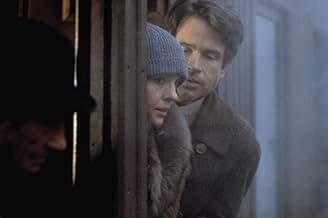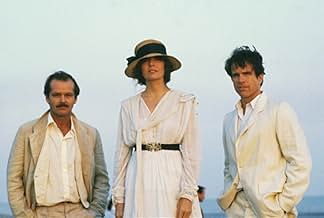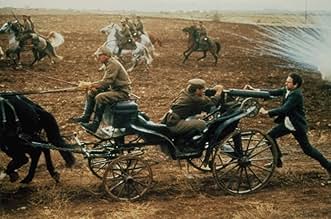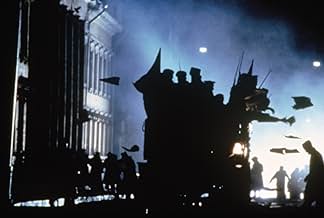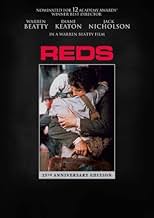VALUTAZIONE IMDb
7,3/10
25.743
LA TUA VALUTAZIONE
Un giornalista americano radicale viene coinvolto nella rivoluzione comunista in Russia e spera di portare il suo spirito e il suo idealismo negli Stati Uniti.Un giornalista americano radicale viene coinvolto nella rivoluzione comunista in Russia e spera di portare il suo spirito e il suo idealismo negli Stati Uniti.Un giornalista americano radicale viene coinvolto nella rivoluzione comunista in Russia e spera di portare il suo spirito e il suo idealismo negli Stati Uniti.
- Regia
- Sceneggiatura
- Star
- Vincitore di 3 Oscar
- 22 vittorie e 37 candidature totali
Eleanor Wilson
- Mrs. Reed
- (as Eleanor D. Wilson)
Recensioni in evidenza
Warren Beatty's magnum opus Reds was presented as a revival film official selection of the New York Film Festival 2006 to celebrate the twenty-fifth anniversary of its original appearance.
Reds's greatest virtue may be that it's grand, without being pompous, film-making. It's a film that takes some pride in being big and turbulent and unruly. It's important, but it's not tidy. It's in part certainly very much about ideology, but it avoids sharp, well-honed edges or large hard-etched "points." John Reed (played by the film's impresario, its sole producer, director, co-author, and star, Warren Beatty) was a man who happened to be able to write a first-hand account of the Bolshevik revolution, a long-time bestseller called Ten Days That Shook the World. At that time early in the twentieth century in America Reed arguably was a central figure, if only in the sense that during his time in Greenwich Village he managed to be (as he wanted to be) consistently at the center of things American political and cultural when he wasn't in Russia (which was pretty central then too). Roger Ebert thinks the movie "never succeeds in convincing us that the feuds between the American socialist parties were much more than personality conflict and ego-bruisings" (that may depend on how hard we need to be convinced to begin with), but we do care about Reds (Ebert thinks) as "a traditional Hollywood romantic epic, a love story written on the canvas of history, as they used to say in the ads it is the thinking man's Doctor Zhivago, told from the other side, of course." What about the choice of Warren Beatty and Diane Keaton as the lovers? Initially that may seem an odd and chemistry-poor decision. (I'm not sure I overcome that impression.) But arguably the film takes long enough with each of its main characters to make them into rounded people, complex enough to be attractive to others and to each other. Beatty uses the romance to hold the story together, and in doing so, he follows a conventional enough scheme. Reds stands out from other American mainstream products and for all its maverick central force, it remains that in its attempt to deal seriously with complex socio-political events during a turbulent period, and to approach them in an open-minded way. Beatty weaves other significant characters into the fabric of his drama, notably the leftist activist Emma Goldman (Maureen Stapleton, who got the Oscar for Best Supporting Actress) and the radical editor Max Eastman (Edward Herrmann), who are members of the same political-intellectual salon into which he brings Louise, as is the playwright Eugene O'Neill (Jack Nicholson).
Beatty's filmic recreation of John Reed is good in not being too serious or too idealized: in having a silly side Beatty's Reed perhaps has something of himself. Reed's lover Louise Bryant (Keaton), though originally a bourgeois lady from Portland, is similarly rounded; she's led by her relationship to Reed to develop other facets and strengths, and further enlarged as a personality through the way the film depicts her long affair with the alcoholic O'Neill, played by a toned-down but emotionally potent Nicholson. His discontent and negative energy are disturbing. Personalities anchor the film; but in some of the political debates and adventures one loses track and forgets why Reed is somewhere in Russia. He is at the center of things. But why he is where he is otherwise at certain moments is uncertain. In its ambition to keep juggling the many balls of major personalities and major political currents and historical events, Reds loses some of its narrative clarity and momentum over time. Complex political and historical currents are tracked, but the emotional trajectory loses its momentum. Nonetheless the film develops sweep in its length of three and a quarter hours. One walks out convinced that the material was complex enough to be worthy of such length, even if Beatty and his co-writer Trevor Griffiths could not whip it all into shape.
Whether it's all worth it on the stage of international cinema or not, this is a film of historical interest as a great independent project, begun logically in the Seventies, but completed right in the middle of Hollywood by an American intelligent and engaged enough to be star, director, writer, and producer, to raise $35 million to do it, and to make more or less the movie he wanted to make right in the middle, so to speak, of a wave of conservatism and yuppiedom, in the early Eighties, when people were thinking about making money and making it, when Ronald Reagon was President of the United States. What more appropriate time to reexamine this achievement than in the middle of the second term of George Bush II? No doubt Beatty took on this story because he was interested in a time in America when it was rife with left-wing politics. But he is realistic, and he made a Hollywood movie, with big stars and romance. And that's what it is and remains. But one can't imagine anybody else making it, and that's what makes it worth revisiting. Warren Beatty is an admirable maverick in the clone-heavy world of Southern California media-moguldom. He's a real person. And this is his great performance as a person and as an artist. I first saw it with a group of real communists. "We're "reds," they said as we walked out. The theater staff looked impressed. I was bowled over by their pride. Not everyone watches this film as a "traditional Hollywood romantic epic." It would never have been made if that were all it was. Its grandeur and ambition are still moving and it must not be forgotten. For a more pungent treatment of a political and social theme starring Beatty, consider Hal Ashby's 1975 Shampoo.
Reds's greatest virtue may be that it's grand, without being pompous, film-making. It's a film that takes some pride in being big and turbulent and unruly. It's important, but it's not tidy. It's in part certainly very much about ideology, but it avoids sharp, well-honed edges or large hard-etched "points." John Reed (played by the film's impresario, its sole producer, director, co-author, and star, Warren Beatty) was a man who happened to be able to write a first-hand account of the Bolshevik revolution, a long-time bestseller called Ten Days That Shook the World. At that time early in the twentieth century in America Reed arguably was a central figure, if only in the sense that during his time in Greenwich Village he managed to be (as he wanted to be) consistently at the center of things American political and cultural when he wasn't in Russia (which was pretty central then too). Roger Ebert thinks the movie "never succeeds in convincing us that the feuds between the American socialist parties were much more than personality conflict and ego-bruisings" (that may depend on how hard we need to be convinced to begin with), but we do care about Reds (Ebert thinks) as "a traditional Hollywood romantic epic, a love story written on the canvas of history, as they used to say in the ads it is the thinking man's Doctor Zhivago, told from the other side, of course." What about the choice of Warren Beatty and Diane Keaton as the lovers? Initially that may seem an odd and chemistry-poor decision. (I'm not sure I overcome that impression.) But arguably the film takes long enough with each of its main characters to make them into rounded people, complex enough to be attractive to others and to each other. Beatty uses the romance to hold the story together, and in doing so, he follows a conventional enough scheme. Reds stands out from other American mainstream products and for all its maverick central force, it remains that in its attempt to deal seriously with complex socio-political events during a turbulent period, and to approach them in an open-minded way. Beatty weaves other significant characters into the fabric of his drama, notably the leftist activist Emma Goldman (Maureen Stapleton, who got the Oscar for Best Supporting Actress) and the radical editor Max Eastman (Edward Herrmann), who are members of the same political-intellectual salon into which he brings Louise, as is the playwright Eugene O'Neill (Jack Nicholson).
Beatty's filmic recreation of John Reed is good in not being too serious or too idealized: in having a silly side Beatty's Reed perhaps has something of himself. Reed's lover Louise Bryant (Keaton), though originally a bourgeois lady from Portland, is similarly rounded; she's led by her relationship to Reed to develop other facets and strengths, and further enlarged as a personality through the way the film depicts her long affair with the alcoholic O'Neill, played by a toned-down but emotionally potent Nicholson. His discontent and negative energy are disturbing. Personalities anchor the film; but in some of the political debates and adventures one loses track and forgets why Reed is somewhere in Russia. He is at the center of things. But why he is where he is otherwise at certain moments is uncertain. In its ambition to keep juggling the many balls of major personalities and major political currents and historical events, Reds loses some of its narrative clarity and momentum over time. Complex political and historical currents are tracked, but the emotional trajectory loses its momentum. Nonetheless the film develops sweep in its length of three and a quarter hours. One walks out convinced that the material was complex enough to be worthy of such length, even if Beatty and his co-writer Trevor Griffiths could not whip it all into shape.
Whether it's all worth it on the stage of international cinema or not, this is a film of historical interest as a great independent project, begun logically in the Seventies, but completed right in the middle of Hollywood by an American intelligent and engaged enough to be star, director, writer, and producer, to raise $35 million to do it, and to make more or less the movie he wanted to make right in the middle, so to speak, of a wave of conservatism and yuppiedom, in the early Eighties, when people were thinking about making money and making it, when Ronald Reagon was President of the United States. What more appropriate time to reexamine this achievement than in the middle of the second term of George Bush II? No doubt Beatty took on this story because he was interested in a time in America when it was rife with left-wing politics. But he is realistic, and he made a Hollywood movie, with big stars and romance. And that's what it is and remains. But one can't imagine anybody else making it, and that's what makes it worth revisiting. Warren Beatty is an admirable maverick in the clone-heavy world of Southern California media-moguldom. He's a real person. And this is his great performance as a person and as an artist. I first saw it with a group of real communists. "We're "reds," they said as we walked out. The theater staff looked impressed. I was bowled over by their pride. Not everyone watches this film as a "traditional Hollywood romantic epic." It would never have been made if that were all it was. Its grandeur and ambition are still moving and it must not be forgotten. For a more pungent treatment of a political and social theme starring Beatty, consider Hal Ashby's 1975 Shampoo.
An engrossing film about John Reed's love affair with Louise Bryant and his struggles in the midst of the Russian Revolution. There are great performances from Beatty, Keaton, Nicholson (excellent as Eugene O'Neill) and Stapelton in her Oscar winning performance as Emma Goldman. Beatty's precision and timing in the use of his camera in this picture is a superb achievement. There is a touch of David Lean in director Beatty in this film. The color, the editing, the sound. All of those important filmic elements are at play here in great form. Beatty won the Best Director Oscar, but lost the Best Picture award to Chariots of Fire.
Imagine going into a room and telling a studio you want to make a film about American Communist reporters during the 1917 Russian revolution and that it will be over three hours long and you won't even get to Russia until almost two hours in. But it was really very simple. It was Warren Beatty doing the plugging. And it actually made money. Today getting this kind of film made would be impossible for anybody. The suits want creatures from some other world wearing capes and carrying tridents spouting vague dialogue that is supposed to sound deep with lots and lots of special effects. But I digress.
So this is basically the story of John Reed and Louise Bryant, two left-wing writers and activists whose affair and marriage only lasted five years, ending with his death in Russia in 1920, but covering some incredibly important American and world history. Bryant first meets Reed when he speaks at the Liberal Club in Portland, Oregon. She's pretentious - denying that she's married or even believes in marriage - as she and Reed have an all-night discussion of writing and politics - and nothing else - at her studio around the corner. When they encounter each other by chance some days later, surrounded by people who know them both, the truth comes out in an extended meet cute encounter that Bryant is married to a dentist and living a bourgeoisie lifestyle. But she is dissatisfied and wants more.
At Reed's invitation, Bryant follows Reed back to New York City and moves into his apartment. But at first she isn't respected when she's cross examined by Reed's highbrow circle of radical friends, asked what she does, and she says she writes about "everything". The couple fights, makes up, engages in socialist politics and activism, and are separated for long periods of time, usually because Reed is galivanting about the country writing about this or that. Ultimately, the Czar is overthrown in Russia and the pair go there when it looks like the Bolsheviks will overthrow the provisional government instituted after the downfall of the Czar.
It's downhill from there for our socialist couple, because it is at this point they encounter the tired but true old saying that absolute power corrupts absolutely. Back in the United States, energized by what has happened in Russia, the Socialist Party fractures into a conventional and Communist wing, and then the Communist wing fractures yet again, largely over the issue of control. When Reed returns to Russia after the Communists have had a chance to consolidate power, he finds them to have become dogmatic and are censoring what he is allowed to say when speaking to crowds. He dies young and disillusioned in a Russian hospital.
Technically this was for sure a great accomplishment. It does a good job of drawing you into the time and place it is set. I felt like I was experiencing these important events myself rather than just watching them be recreated onscreen. The witnesses add some context, although I wish I knew more about them. I remember at the time wondering when these conversations were recorded, because in 1981 they would have had to be over 90 to have known either Reed or Bryant. The love story is convincing although the couple spends long periods of time apart.
I'd recommend it, but realize it is not for the faint of heart or those short in attention span.
So this is basically the story of John Reed and Louise Bryant, two left-wing writers and activists whose affair and marriage only lasted five years, ending with his death in Russia in 1920, but covering some incredibly important American and world history. Bryant first meets Reed when he speaks at the Liberal Club in Portland, Oregon. She's pretentious - denying that she's married or even believes in marriage - as she and Reed have an all-night discussion of writing and politics - and nothing else - at her studio around the corner. When they encounter each other by chance some days later, surrounded by people who know them both, the truth comes out in an extended meet cute encounter that Bryant is married to a dentist and living a bourgeoisie lifestyle. But she is dissatisfied and wants more.
At Reed's invitation, Bryant follows Reed back to New York City and moves into his apartment. But at first she isn't respected when she's cross examined by Reed's highbrow circle of radical friends, asked what she does, and she says she writes about "everything". The couple fights, makes up, engages in socialist politics and activism, and are separated for long periods of time, usually because Reed is galivanting about the country writing about this or that. Ultimately, the Czar is overthrown in Russia and the pair go there when it looks like the Bolsheviks will overthrow the provisional government instituted after the downfall of the Czar.
It's downhill from there for our socialist couple, because it is at this point they encounter the tired but true old saying that absolute power corrupts absolutely. Back in the United States, energized by what has happened in Russia, the Socialist Party fractures into a conventional and Communist wing, and then the Communist wing fractures yet again, largely over the issue of control. When Reed returns to Russia after the Communists have had a chance to consolidate power, he finds them to have become dogmatic and are censoring what he is allowed to say when speaking to crowds. He dies young and disillusioned in a Russian hospital.
Technically this was for sure a great accomplishment. It does a good job of drawing you into the time and place it is set. I felt like I was experiencing these important events myself rather than just watching them be recreated onscreen. The witnesses add some context, although I wish I knew more about them. I remember at the time wondering when these conversations were recorded, because in 1981 they would have had to be over 90 to have known either Reed or Bryant. The love story is convincing although the couple spends long periods of time apart.
I'd recommend it, but realize it is not for the faint of heart or those short in attention span.
.
I am old enough to have lived through (probably) three different Americas. These are radically different worlds. It isn't just the mood, styles or state of the economy; its the adoption of a whole cosmology. Religions change under our feet. Family, love, belonging. These things are malleable yet largely beyond our control and we forget what "things were like." Memory always is constructed in terms of the present world.
Always.
So projects like this are necessary. We cannot know who we are unless we remind ourselves who we were.
The ordinary fold here is a romance, folded into grand political actions. Here they are a bit more cerebral than usual, but never getting past the notion of simple justice.
The more unusual and complex fold is that we see a story based on real events and people. Interspersed with that story are interviews of people who were personally involved in the story. These are remarkable, the way they are captured and the way they are edited to overlap with and annotate the story. But much more engaging is that these are enticing people, many with minds and phases that invite us into their faces made warmer and more open by Beatty's camera. I compare this to the "Up" serious and the contrast is astonishing. True, here we want to be informed about the lives of others, and the "Up" goals pretend that the people randomly selected decades ago are remotely worth knowing.
But these folks are. We want more, simply based on their implicit invitation, and we carry ourselves into the narrative more forcefully, sort of like the characters do. This is folding doing its job and doing it well. They remember. I remember, and therefore am.
Ted's Evaluation -- 3 of 3: Worth watching.
I am old enough to have lived through (probably) three different Americas. These are radically different worlds. It isn't just the mood, styles or state of the economy; its the adoption of a whole cosmology. Religions change under our feet. Family, love, belonging. These things are malleable yet largely beyond our control and we forget what "things were like." Memory always is constructed in terms of the present world.
Always.
So projects like this are necessary. We cannot know who we are unless we remind ourselves who we were.
The ordinary fold here is a romance, folded into grand political actions. Here they are a bit more cerebral than usual, but never getting past the notion of simple justice.
The more unusual and complex fold is that we see a story based on real events and people. Interspersed with that story are interviews of people who were personally involved in the story. These are remarkable, the way they are captured and the way they are edited to overlap with and annotate the story. But much more engaging is that these are enticing people, many with minds and phases that invite us into their faces made warmer and more open by Beatty's camera. I compare this to the "Up" serious and the contrast is astonishing. True, here we want to be informed about the lives of others, and the "Up" goals pretend that the people randomly selected decades ago are remotely worth knowing.
But these folks are. We want more, simply based on their implicit invitation, and we carry ourselves into the narrative more forcefully, sort of like the characters do. This is folding doing its job and doing it well. They remember. I remember, and therefore am.
Ted's Evaluation -- 3 of 3: Worth watching.
A fascinating, expertly made look at why "The Red Menace" never was that, here in the United States, and why the Russian Revolution never turned out to be what it could have been.
Technically, the movie is beautiful to look at, well written and well acted. It has a lot of great professional actors in it, and lots of the people who were actually there at the time this part of our history was being made. The "witnesses" device works well for Warren Beatty who as a director and writer always seems to include the easily overlooked details of the stories in most of his films. He is also at his fumbling best as John Reed, whose 10 Days That Shook The World fell into well-deserved obscurity probably almost as soon as it was written. That this great historical perspective could rise out of that is truly a testimony to Beatty's talent.
There are many great acting performances in this film, including one of Jack Nicholson's very best as Eugene O'Neil, as well as those of Paul Sorvino, Gene Hackman and George Plimpton who demonstrate the range of persons who touched Jack Reed's life. Jerzy Kozinsky is riveting as Zinoviev.
If one likes historically based dramas, this one should leave you breathless, and will probably leave you wanting to watch it more than once, just to make sure you don't miss any of the details.
10 Stars, Absolutely.
Technically, the movie is beautiful to look at, well written and well acted. It has a lot of great professional actors in it, and lots of the people who were actually there at the time this part of our history was being made. The "witnesses" device works well for Warren Beatty who as a director and writer always seems to include the easily overlooked details of the stories in most of his films. He is also at his fumbling best as John Reed, whose 10 Days That Shook The World fell into well-deserved obscurity probably almost as soon as it was written. That this great historical perspective could rise out of that is truly a testimony to Beatty's talent.
There are many great acting performances in this film, including one of Jack Nicholson's very best as Eugene O'Neil, as well as those of Paul Sorvino, Gene Hackman and George Plimpton who demonstrate the range of persons who touched Jack Reed's life. Jerzy Kozinsky is riveting as Zinoviev.
If one likes historically based dramas, this one should leave you breathless, and will probably leave you wanting to watch it more than once, just to make sure you don't miss any of the details.
10 Stars, Absolutely.
Lo sapevi?
- QuizReportedly, Warren Beatty reshot some scenes up to 35 times. Paul Sorvino said he did as many as 70 takes for one scene, and Maureen Stapleton said she did as many as 80 takes for another. Reportedly, of this, she famously once said to Warren Beatty, "Are you out of your fucking mind?" This earned her a round of applause from the crew.
- BlooperThe Finnish doctor tells Reed that his blood pressure is too high, but at that time, hypertension was not considered a problem by most doctors, who did not even consider treating it. Not until the mid-'40s did doctors begin to understand the dangers of high blood pressure.
- Citazioni
Eugene O'Neill: If you were mine, I wouldn't share you with anybody or anything. It'd be just you and me. We'd be the center of it all. I know it would feel a lot more like love than being left alone with your work.
- Curiosità sui creditiAs the credits roll, additional interviews with the 'witnesses' play.
- Versioni alternativeThree seconds of horse falls were cut from the British version. The DVD supplements showing these shots are also cut in England.
- ConnessioniFeatured in Sneak Previews: Rollover, Quartet, My Dinner with Andre, Reds (1981)
- Colonne sonoreYou're a Grand Old Flag
Written by George M. Cohan
I più visti
Accedi per valutare e creare un elenco di titoli salvati per ottenere consigli personalizzati
Dettagli
- Data di uscita
- Paese di origine
- Lingue
- Celebre anche come
- Comrades
- Luoghi delle riprese
- Senate Square, Helsinki, Finlandia(on location)
- Aziende produttrici
- Vedi altri crediti dell’azienda su IMDbPro
Botteghino
- Budget
- 32.000.000 USD (previsto)
- Lordo Stati Uniti e Canada
- 40.382.659 USD
- Fine settimana di apertura Stati Uniti e Canada
- 2.325.029 USD
- 6 dic 1981
- Lordo in tutto il mondo
- 40.382.788 USD
Contribuisci a questa pagina
Suggerisci una modifica o aggiungi i contenuti mancanti



